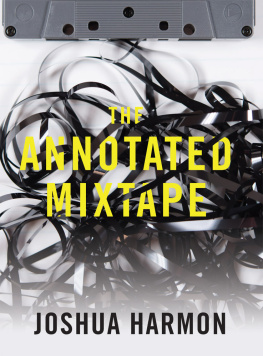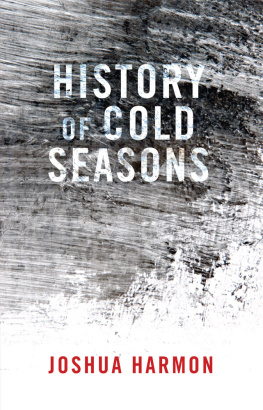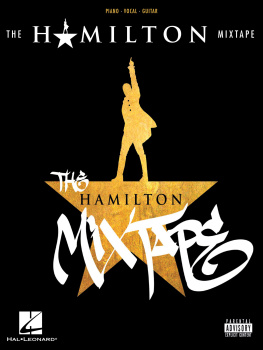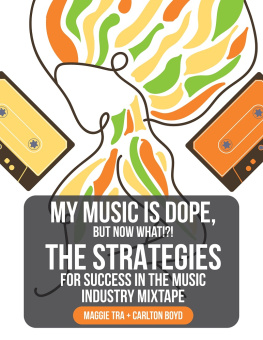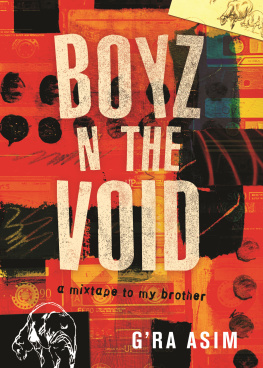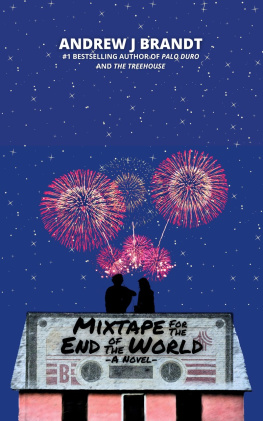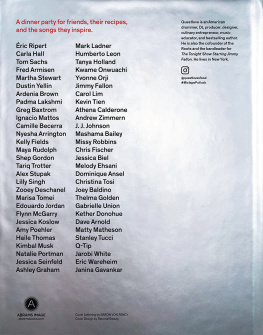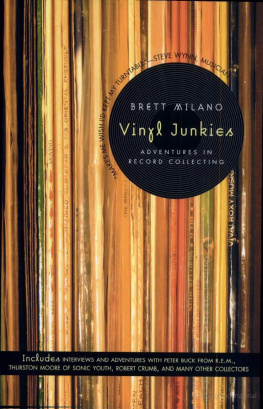Joshua Harmon - The Annotated Mixtape
Here you can read online Joshua Harmon - The Annotated Mixtape full text of the book (entire story) in english for free. Download pdf and epub, get meaning, cover and reviews about this ebook. year: 2014, publisher: Dzanc Books, genre: Detective and thriller. Description of the work, (preface) as well as reviews are available. Best literature library LitArk.com created for fans of good reading and offers a wide selection of genres:
Romance novel
Science fiction
Adventure
Detective
Science
History
Home and family
Prose
Art
Politics
Computer
Non-fiction
Religion
Business
Children
Humor
Choose a favorite category and find really read worthwhile books. Enjoy immersion in the world of imagination, feel the emotions of the characters or learn something new for yourself, make an fascinating discovery.
- Book:The Annotated Mixtape
- Author:
- Publisher:Dzanc Books
- Genre:
- Year:2014
- Rating:4 / 5
- Favourites:Add to favourites
- Your mark:
- 80
- 1
- 2
- 3
- 4
- 5
The Annotated Mixtape: summary, description and annotation
We offer to read an annotation, description, summary or preface (depends on what the author of the book "The Annotated Mixtape" wrote himself). If you haven't found the necessary information about the book — write in the comments, we will try to find it.
Most of the time, Theodore Adorno has noted, records are virtual photographs of their owners. The Annotated Mixtape is a memoir of record collecting, cross-fades music with personal history and American history and culture (the 2008 Recession, AM radio, Reaganomics, nuclear war) to show how the vinyl LP has shaped and informed the authors life.
The Annotated Mixtape — read online for free the complete book (whole text) full work
Below is the text of the book, divided by pages. System saving the place of the last page read, allows you to conveniently read the book "The Annotated Mixtape" online for free, without having to search again every time where you left off. Put a bookmark, and you can go to the page where you finished reading at any time.
Font size:
Interval:
Bookmark:
THE ANNOTATED MIXTAPE
ALSO BY JOSHUA HARMON
Quinnehtukqut
Scape
Le Spleen de Poughkeepsie
History of Cold Seasons
THE ANNOTATED MIXTAPE
JOSHUA HARMON

Dzanc Books
5220 Dexter Ann Arbor Road
Ann Arbor, MI 48103
dzancbooks.org
Copyright 2014 Joshua Harmon
All rights reserved.
ISBN 978-1-936873-24-1
Cover design by Steven Seighman
Cover photograph by James Gehrt
Grateful acknowledgment is made to the publications in which these essays were originally published, sometimes in slightly different form: AGNI, The Believer, Black Warrior Review, Cincinnati Review, Cloud Rodeo, Coldfront, DIAGRAM, Five Points, Florida Review, Gulf Coast, Hobart, MAKE, New England Review, New England Review Digital, The Normal School, Open Letters Monthly, Quarterly West, The Rumpus, and Salt Hill.
The author is especially grateful to Carolyn Kuebler, Stephen Donadio, and Katy Henriksen for publishing many of these essays, and for editorial advice that has improved them immeasurably.
Library of Congress Cataloging-in-Publication Data
Harmon, Joshua, 1971
The annotated mixtape / Joshua Harmon.First edition.
pages cm
ISBN 978-1-936873-24-1 (pbk.)
1. Harmon, Joshua, 1971KnowledgeMusic. 2. Sound recordingsCollectors and collectingBiography. 3. MusicBiography. I. Title.
PS3608.A7485Z46 2014
814.6dc23
[B]
2014037078
Printed in the United States of America
FIRST EDITION
To my parents, for my first stereo; to Sue and Steve Price, for early lessons in listening; to Ben Reid, Mikey Thaller, Will Pritchard, Hua Hsu, and Jed Mayer, for the mutual enabling; and to Sarah Goldstein, for her patience
CONTENTS
But if I hear a tune with understanding, doesnt something special go on in mewhich does not go on if I hear it without understanding? And what?
Ludwig Wittgenstein, Zettel
(translated by G.E.M. Anscombe)
What the gramophone listener actually wants to hear is himself, and the artist merely offers him a substitute for the sounding image of his own person, which he would like to safeguard as a possession. The only reason that he accords the record such value is because he himself could also be just as well preserved. Most of the time records are virtual photographs of their owners, flattering photographsideologies.
Theodor Adorno, Essays on Music
(translated by Thomas Y. Levin)
C-90
Id give anything to know whether she likes me for my personality or for my comic-book collection, Charlie Brown broods in a thought bubble above the bubble of his own oversized head. Because I have more than four thousand vinyl records in my living room, I understand well this sort of nagging introspection. Charles Schulz sketched the panel in 1953, but the intricate, implicated relationships we have with our possessions continue to generate such age-old questions, and such unanswerable ones.
Do I like myselfdo I want to be likedfor my personality, or for my record collection? Or: does she like medo I want her to like mefor my personality, or for my record collection? Are such collectionsand attendant anxieties about being likedpurely the province of those who, like Charlie Brown, remain fixed at a particular age, who refuse in some way to mature? Or, worse: amid a burgeoning body of literature in which every possible cultural artifact or phenomenon appears as an aide-mmoire, who wants to be the dude staying up too late, rattling his keyboard to describe the fundamental effect some crappy pop song had on his teenage self-understanding?
Still, Charlie Brownand Charles Schulzmight be disappointed to learn that few music fans continue to collect in the way that word has usually been understood. For well over a decade, our music has existed primarily in digital form on our hard drives. More recently, a number of on-demand, cloud-based services have revised the meaning ofor the need foreven incorporeal collections, and rendered the act of listening simply a question of bandwidth. Music has become so readily accessible that we have little need to store it, or even to own it: whenever we want to hear a particular song, we can almost always satisfy that urge, no matter how obscure the music, via some online stream in no more time than it takes to type a titleor even less time, with auto-complete. For listeners who grew up after the file-sharing era beganand for listeners for whom music functions as background noise, something to accompany other, more primary activitiesthis situation is unremarkable. For many decades, music has entered our homes and our cars via the airwaves. But I have been a record collector ever since the day in 1982 when I pedaled my ten-speed to some long-gone record store in Tatnuck Square, handed over a few damp, crumpled bills for a shrinkwrapped copy of Duran Durans Rio LP, and then, in the privacy of my bedroom, felt moved as much by the music as the blurry nighttime cityscape on the back cover, or what seemed the weird poetry of the lyrics printed on the inner sleeve (Must be lucky weather when you find the kind of wind that you need). My ever-evolving record collection still often feels like a reference to my personality, or vice versa, and the collections physical bulk sometimes seems reassuring evidence of my history.
In any case, those of us who do still collect music might more accurately be said to select: we dontmost of uscollect anything; collecting everything is impossible, short of a Smithsonian-sized space, budget, and mission. No, we collect in part to preserve and recalland excludesmall memories, I might argue: the record an ex-girlfriend or -boyfriend owned, the song that was playing when, the LP I should have (and so easily could have) bought five or fifteen years ago because, and so on. If we didnt desire to relive chosen bits of our lives via music, we wouldnt bother stockpiling recordings. We wouldnt need to: wed simply let our endless soundstreams random, present-tense moments stir whatever feelings and associations they might. In an age when the imperative share appears throughout our cross-networked social media apps, owning musicor letting it own usseems almost deliberately perverse.

During high school, my friends and I saw swapping music as a type of homework far more important than geometric proofs and term papers about The Merchant of Venice. Our medium was the ninety-minute cassetteC-90, in industry parlanceoften re-recorded so many times the tape warbled. Our bedroom stereos allowed us the privacy for intense, studious retreat, and we filtered our lives into sequences of songs to match our moods. In an unconscious erotics of analog machinery, Id finger the buttons on my tapedeck, rewinding and pausing; lightly touch stylus to spinning vinyl; then press play + record to try to fill every millimeter of tape with sound, cramming the end of a side with short songs and hoping the last songs fadeout didnt run onto the leader tape. Id always crank up the line-level adjustment to flirt with 0 dBwhere the bars turned from blue to redso that the mixtapes I made sounded as loud as possible when played back.
While burning a CD or uploading a playlist takes no more than a moment, making tapes devoured more than real time. A ninety-minute cassette involved hours of effort: gathering the chosen records, determining a sequence, dubbing each song to tape, re-recording mistakes, erasing a few songs when the order seemed wrong, writing out the tracklist, and drawing or collaging cover art. Making tapes, we called this activity, to emphasize the personally constructed, labor-intensive process: the cassettes we used may have been shoddy, mass-produced throwaways, but our attention and care transformed each one into something singularand, of course, we found pleasure in the production as much as in giving each other the tapes. And while certain music apps will publicize your listening choices from your home computer to the newsfeeds of your nine hundred friends, mixtapes were made, and usually listened to, in private: no one could mock your music, or add a comment that they loved a song, too. The mixtape was an intimate, one-off object, made by one person for a very specific audience of one other person, and the burden of figuring out a band or a songnever mind the possible significance behind the giftwas yours alone.
Next pageFont size:
Interval:
Bookmark:
Similar books «The Annotated Mixtape»
Look at similar books to The Annotated Mixtape. We have selected literature similar in name and meaning in the hope of providing readers with more options to find new, interesting, not yet read works.
Discussion, reviews of the book The Annotated Mixtape and just readers' own opinions. Leave your comments, write what you think about the work, its meaning or the main characters. Specify what exactly you liked and what you didn't like, and why you think so.

